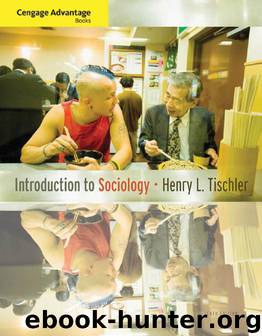Introduction To Sociology by Henry L. Tischler

Author:Henry L. Tischler
Language: eng
Format: mobi, epub
Publisher: Cengage Learning
Published: 0101-01-01T00:00:00+00:00
● DEFINING MARRIAGE
When college students from 10 countries were
asked whether they would marry without love, 86% of
Marriage, an institution found in all societies, is the
American college students said they would not. Only
socially recognized, legitimized, and supported union of
24% of college students from India said no to marriage
individuals of opposite sexes. It diff ers from other unions
without love. Cultures are likely to indulge in romantic
(such as friendships) in that (1) it is initiated in a pub-
love if they are wealthy and value individualism over the
lic (and usually formal) manner; (2) it includes sexual
community (Levine, 1993).
intercourse as an explicit element of the relationship; (3)
Romantic love can be defi ned in terms of fi ve dimen-
it provides the essential condition for legitimizing off -
sions: (1) idealization of the loved one, (2) the notion of
spring (i.e., it provides newborns with socially accepted
a one and only, (3) love at fi rst sight, (4) love winning
statuses); and (4) it is intended to be a stable and endur-
out over all, and (5) an indulgence of personal emotions
ing relationship. Th
us, although almost all societies allow
(Lantz, 1982).
for divorce—that is, the breakup of marriage—no soci-
In some cultures, people expect love to develop after
ety endorses it as an ideal norm. Sociologists will need
marriage. Hindu children are taught that marital love is
to revise the defi nition of marriage now that a number of
the essence of life. Men and women often enter married
European countries and several states in America have
life enthusiastically expecting a romance to develop. As
legalized same sex marriages
the Hindu saying goes, “First we marry, then we fall in
love” (Fisher, 1992).
Romantic Love
In many of the world’s other societies, romantic love
What would you think of someone who used the follow-
is unknown or seen as a strange maladjustment. It might
ing proposal of marriage?
exist, but it has nothing to do with marriage. Marriage
in these societies is seen as an institution that organizes
It does not appear to me that my hand is unworthy of your
or patterns the establishment of economic, social, and
acceptance, or that the establishment I can off er would
even political relationships among families. Th
ree fami-
be any other than highly desirable. My situation in life, my
lies ultimately are involved: families of origin or fami-
connections with the family, and my relationship to your
lies of orientation, the two families that produced the
own, are circumstances highly in my favor; and you should
two spouses and their family of procreation, the family
take it into further consideration, that in spite of manifold
created by the spouses’ union.
attractions, it is by no means certain that another off er of
A belief in romantic love helps make men and women
marriage may even be made to you.
more independent of their relatives. Romantic love
Th
is proposal, which would very likely produce out-
weakens the emotional ties that bind people to their
rage and be rejected by many women today, was made
families. It makes it natural for partners to be commit-
by Mr. Collins to Elizabeth in Jane Austen’s novel, Pride
ted to each other and provide mutual support. Romantic
and Prejudice (Austen, 1813). In addition to seeming
love provides a legitimate way to move
Download
Introduction To Sociology by Henry L. Tischler.epub
This site does not store any files on its server. We only index and link to content provided by other sites. Please contact the content providers to delete copyright contents if any and email us, we'll remove relevant links or contents immediately.
| African-American Studies | Asian American Studies |
| Disabled | Ethnic Studies |
| Hispanic American Studies | LGBT |
| Minority Studies | Native American Studies |
Cecilia; Or, Memoirs of an Heiress — Volume 1 by Fanny Burney(31320)
Cecilia; Or, Memoirs of an Heiress — Volume 3 by Fanny Burney(30927)
Cecilia; Or, Memoirs of an Heiress — Volume 2 by Fanny Burney(30884)
The Great Music City by Andrea Baker(21137)
We're Going to Need More Wine by Gabrielle Union(18062)
Bombshells: Glamour Girls of a Lifetime by Sullivan Steve(13098)
Pimp by Iceberg Slim(12920)
All the Missing Girls by Megan Miranda(12737)
Fifty Shades Freed by E L James(12442)
Norse Mythology by Gaiman Neil(11869)
Talking to Strangers by Malcolm Gladwell(11852)
Crazy Rich Asians by Kevin Kwan(8340)
Mindhunter: Inside the FBI's Elite Serial Crime Unit by John E. Douglas & Mark Olshaker(7823)
The Lost Art of Listening by Michael P. Nichols(6457)
Enlightenment Now: The Case for Reason, Science, Humanism, and Progress by Steven Pinker(6400)
Bad Blood by John Carreyrou(5760)
The Four Agreements by Don Miguel Ruiz(5500)
Weapons of Math Destruction by Cathy O'Neil(5027)
We Need to Talk by Celeste Headlee(4857)
